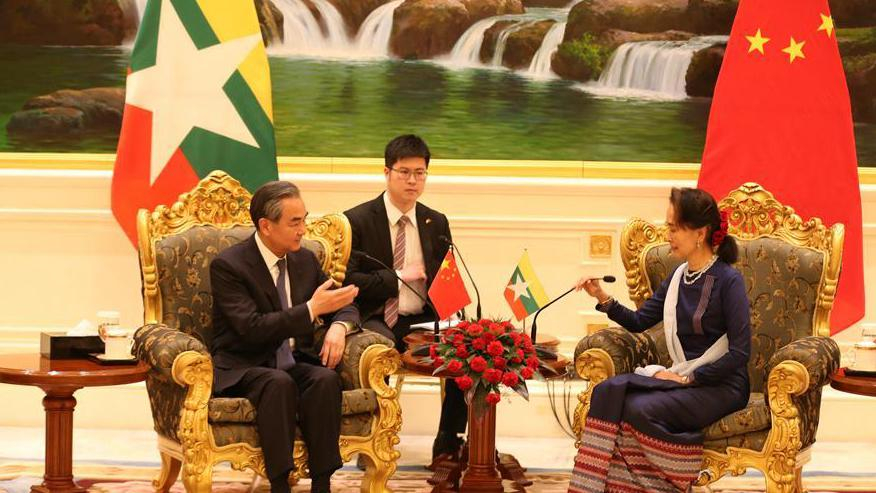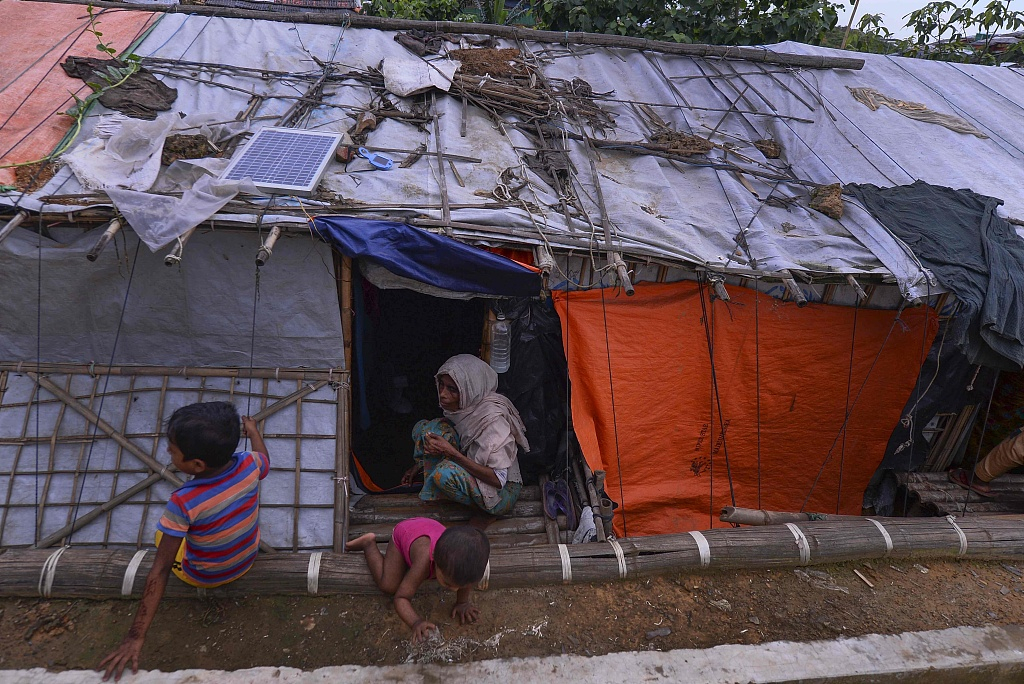
Myanmar's State Counsellor and Foreign Minister Aung San Suu Kyi (R) meets with visiting Chinese State Councilor and Foreign Minister Wang Yi in Nay Pyi Taw, Myanmar, December 7, 2019. /Xinhua Photo
Myanmar's State Counsellor and Foreign Minister Aung San Suu Kyi (R) meets with visiting Chinese State Councilor and Foreign Minister Wang Yi in Nay Pyi Taw, Myanmar, December 7, 2019. /Xinhua Photo
Editor's note: Peng Nian is an associate fellow at the National Institute for South China Sea Studies and a non-resident fellow at the Institute for China-America Studies. The article reflects the author's opinions and not necessarily the views of CGTN.
On December 7, Chinese State Councilor and Foreign Minister Wang Yi visited Myanmar and lent strong support to Myanmar's State Counselor Daw Aung San Suu Kyi, who will head to the international court of justice (ICJ) in The Hague to defend Myanmar against accusations of genocide. Wang is the first foreign diplomat who came to Myanmar to show support to the democratic government and the Burmese military which have been criticized fiercely by the West since Aung San Suu Kyi's announcement of her appearance in the ICJ at the end of last month.
China has continued to provide necessary assistance to Myanmar to solve the Rohingya crisis in the past two years, mainly including the "three steps" proposal of the resolution of Rohingya crisis, and the diplomatic mediation on the agreement between Myanmar and Bangladesh on repatriating of Rohingya refugees who fled to Bangladesh.
Wang's trip to Myanmar is the latest diplomatic support that China lent to Myanmar since the Rohingya refugee crisis broke out in August 2017 in Rakhine State, which would help Myanmar mitigate pressures from the international community.
What's more, both sides agreed to accelerate the Belt and Road Initiative (BRI), and promote the China-Myanmar Economic Corridor (CMEC) comprehensively, for opening a new chapter of the comprehensive strategic cooperative partnership.

Rohingya children play in front of a makeshift house at Kutupalong refugee camp, July 22, 2019. /VCG Photo
Rohingya children play in front of a makeshift house at Kutupalong refugee camp, July 22, 2019. /VCG Photo
Actually, the BRI has made great achievements since Myanmar's National League for Democracy (NLD) established a democratic government in 2016, such as the opening of Sino-Myanmar oil pipeline and the agreement on constructing the Kyaukpyu deep-sea port and the industrial park.
Nonetheless, new mega-projects under the BRI have not yet materialized, the new proposed CMEC in particular. In fact, although both governments have vowed to implement the CMEC, few specific projects have been constructed.
During this visit, both countries promised to push forward the physical connectivity and put it into the priority area of the CMEC. Since the CMEC has become the key element of the BRI in Myanmar, the physical connectivity would get strong momentum in the near future.
So far, Myanmar has started to construct the railway from Mandalay to Muse, the main trading post along Myanmar-China border. As China has completed railway construction along China-Myanmar border, there would be a transnational railway connecting Yunnan and Mandalay in the coming years.
Besides, the Kyaukpyu deep-sea port which is the end of the southern branch of the CMEC would also be greatly accelerated. Currently, the main obstacle of the implementation of Kyaukpyu project – the land compensation has been properly addressed, and the Chinese company has also fulfilled its social responsibility.
All these efforts made by China have relieved the anti-Chinese investment sentiments in the local communities in southern Myanmar, and therefore laying a solid foundation for the next steps of the Kyaukpyu project.
The ongoing conflicts between the ethnic rebels and government forces in northern Myanmar have drew growing attentions from both China and Myanmar. The Burmese generals have long pursued for Chinese help of persuading the Kokang rebels and their allies to accept the National Ceasefire Agreements (NCA) while the rebels criticized the military for attacking their camps.
Given this, China has pressured both sides to stop fighting and push forward peace talks in which the Kokang representatives should be included. During this visit, the Burmese military agreed to hold meetings with the ethnic rebels and accelerate peace talks. Since the military has softened its stance on the ethnic rebels, it is likely that the peace process would achieve progress.
To conclude, Wang Yi's Myanmar trip would not only help Myanmar reduce the great pressures from the West, but also promote the pragmatic cooperation and deepen the "Pauk-Phaw" friendship between the two countries.
(If you want to contribute and have specific expertise, please contact us at opinions@cgtn.com.)